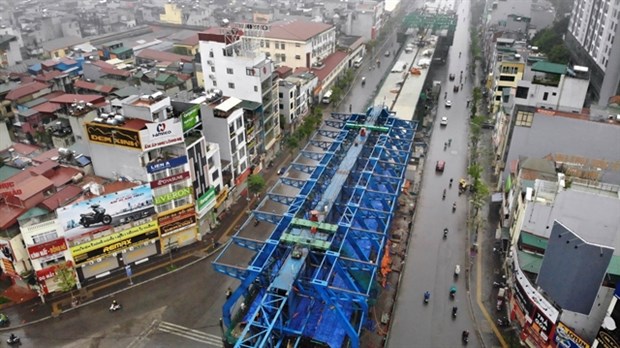
A bridge running along Belt Road No 2 in Hanoi (Photo: VNA)
The proposal was highlighted in a draft Government Resolution about solutions to remove difficulties for businesses and accelerate the disbursement of public investment.
Reducing CIT for SMEs was just a part of the efforts to lower production costs for businesses, of which a number of taxes and fees would also be cut, according to the draft resolution.
Under the draft, the Ministry of Finance would be in charge of forming policies for exemptions or tax reductions to be submitted to the National Assembly this month.
The policies will also include adjustments to deductions on personal income tax, exemptions or reductions for environmental protection tax, and a 50 percent reduction of registration fees for domestically-produced cars and special consumption taxes for the domestic automobile industry.
VAT, which currently stands at 10 percent, would also be halved for pandemic-hit goods and services and input products. VAT refunds would also be considered for sectors which were suffering from the pandemic such as aviation and tourism.
Other policies in consideration included exemptions for agricultural land tax and income tax for business households and individuals.
The Ministry of Finance would also be in charge of issuing circulars about cutting fees for water resources and construction project evaluations. Other fees to be cut included road tolls, seaport charges, aviation service charges and road maintenance fees.
The Ministry of Finance estimated that the value of taxes and fees exempted or reduced would reach 46 trillion VND (1.98 billion USD).
This would be a bold move after Government Decree No 41/2020/ND-CP promised a five-month extension for tax and land use fees worth 180 trillion VND (7.7 billion USD). Under the draft, the postponement could be increased by up to one year.
According to Pham Dinh Thi, director of the finance ministry’s Tax Policy Department, the COVID-19 pandemic had heavily affected a number of socio-economic sectors.
The Ministry of Finance was cooperating with relevant ministries to raise policies to support businesses who were hit hard by the pandemic, Thi said, adding that reducing taxes and fees would help reduce business costs.
In the short-term, State budget revenue would fall, but in the long term, the reduction would promote the development of business and production which would help create jobs, accelerate growth and increase tax revenue, Thi stressed.
Under the draft resolution, interest rates for new and existing loans would be cut by two percentage points.
Loan packages with preferential rates would also be raised for medium and large enterprises suffering from the pandemic, especially those with more than 100 workers that had seen a drop of more than 50 percent in revenue in the first two quarters of this year.
The focus would also be placed on developing trade and ensuring food security to contribute to controlling inflation.
The draft resolution also raised a number of solutions to speed up the disbursement of public investment to drive growth after the pandemic.
According to the Ministry of Finance, total public investment for this year was planned at nearly 700 trillion VND (29.9 billion USD), 2.2 times higher than the sum disbursed in 2019./.
VNA
 Central bank mulls raising gold position limit for lenders
Central bank mulls raising gold position limit for lenders



